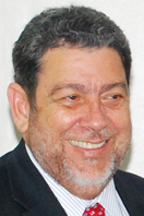
KINGSTOWN, St. Vincent – A staff member of the Ministry of Foreign Affairs, seeking to be diplomatic, told two visiting legislators from the Falkland Islands that Prime Minister Dr. Ralph Gonsalves was unable to see them earlier this month because of scheduling problem.
But Gonsalves, who was acting as Minister of Foreign Affairs at the time, told Parliament yesterday that he has no reason to be diplomatic with the British government and he refused to see the legislator because there was no juridical basis for such a meeting.
“As I made it plain to the British High Commissioner, I did not refuse to see them because of any scheduling programme,” he said in response to a question rom opposition legislator Dr. Godwin Friday, MP for the Northern Grenadines.
“That is what an official in the Ministry of Foreign Affairs told them. I told them the truth. The persons in the Ministry of Foreign Affairs, not the minister, wanted to tell them something that was diplomatic. The British are our friends. I am not going to go around in any diplomatic circles. I am going to tell you the truth why I am not seeing you,” Gonsalves said.
The Falkland Island legislators, along with the Deputy British Commissioner, came to this country as part of a campaign to sensitise regional government about their quest for self-determination. The islands, a self-governed British overseas territory, are at the heart of a 180-year dispute between Argentina and Britain. ALBA nations, at their summit in Caracas this month, supported a resolution by four South American nations, including Argentina, to ban Falkland Island flagged ships from their ports.
Gonsalves said that the ALBA summit merely supported that resolution. He told Parliament that he had rejected the request for a meeting with the legislators before he attended the ALBA meeting in Caracas. He further defended himself against criticisms by Opposition Leader Arnhim Eustace that he was arrogant in refusing to see the Falkland Island lawmakers.
“That is not arrogance. That is a simple question of defending the sovereignty and independence of this country,” Gonsalves said, citing the 1648 Treaty of Westphalia, which identifies the state as the highest actor in international affairs.
“To show you something, two colonial legislators came. The British High Commissioner himself did not consider it worth his while to come to St. Vincent. He sent somebody lower down the totem pole,” Gonsalves further stated.
“I am not a weak leader. I don’t put water in my mouth … when I am speaking on matters of principle. Others may do that and hide and duck. I don’t do that. You take me as you find me and I present an intellectually powerful argument based on principle. You may disagree with it but I have a position.”
Gonsalves said that while the Falkland Islanders, as a member of a “colonial assembly”, had permission from the British government to visit him, Britain could not assume that he would agree to see them.
“That is not what the diplomatic note asked for. The diplomatic note assumed that I would see them. How can you make an assumption about the prime minister of a sovereign country to see two persons from a colonial assembly whom I didn’t invite?”
Gonsalves repeated his analogy that if the premier of Montserrat, another British territory, wanted to see the prime minister of Canada, a diplomatic note will not suffice.
He further said that much was made when the Prime Ministers of Antigua and Barbuda and Dominica, which along with St. Vincent and the Grenadines supported the resolution at the ALBA meeting, according to regional media, “backtracked” from the resolution.
“I don’t know what they retracted from,” Gonsalves said.
He told legislators that the British High Commissioner called him saying that the Argentine Foreign Minister was reported as saying that the Prime Ministers of SVG, Antigua and Barbuda and Dominica spoke to him in Caracas about banning Falkland ships. Antigua had issued a statement saying that is not the case and the British envoy asked if Gonsalves would make such a statement.
“I told him that I am not and St. Vincent is not the battering ram for British foreign policy vis-à-vis Argentina. That we are excellent friends with Britain and we are building good relations with Argentina,” Gonsalves said. He said he further told the British High Commissioner that he had not seen the statement referred to and that he does not “answer things just so in the press”.
“What am I? A water carrier? Am I one of those in the city of Ai who resisted Joshua and permanently remain hewer of wood and carrier of water? No! Never!”
On the specific issue of banning Falkland Island flagged vessels from docking in this country, Gonsalves said:
“The government of St. Vincent and the Grenadine does not act in vain. … In an analogous sense, it is like a court of law. It does not act in vain. If I did not make a statement saying I am banning ships from St. Vincent and the Grenadines, we have an open seas policy. We are not at war with anybody. Why do I now have to say that I am allowing Falkland ships? Ask me if I am allowing Argentinian ships, yes! Falklands, Britain, everywhere. And, as a flagged state, we are interested, unless we are at war, in ships moving.”
Gonsalves further noted that the British Armed Forces, through treaty arrangement, has permission to board Vincentian flagged ships as a visiting military power, but Argentina cannot.
Gonsalves said that this country’s support for the ALBA resolution was “symbolic” since Falkland Island ships do not sail to this country.
His comments came on a day after Argentina’s Tierra del Fuego province denied entry to two cruise liners that were seeking to dock in one of its ports after visiting the Falklands.





